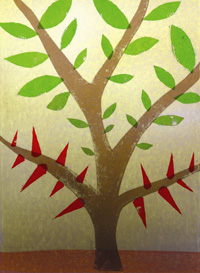Being Jewish
Commentary
Holidays
Rosh Hashanah
Commentary: Gedaliah in the Eye of the Beholde

The Fast of Gedaliah, observed the day after Rosh Hashana (September 21), is among the most overlooked of Jewish holidays. Sandwiched between the Days of Awe, it’s the also-ran of the Jewish calendar: a minor fast day a week before a major one, and an obscure historical commemoration amid the most well known of Jewish festivals. Few people even know who, or what, Gedaliah was. But it’s worth a closer look.
Gedaliah was the Jewish governor in charge of Judea after the Babylonians conquered it in the 6th century C.E. An accommodationist, he urged the Judeans to live with their oppressors rather than die at their hands. He was assassinated by a fellow Judean. The result? The end of Judean independence and a 70-year exile.
The character of Gedaliah resonates with many later Jewish figures. Most likely, the Talmudic rabbis instituted the fast because he was a bit like them; they, too, urged cooperation with, rather than rebellion against, a ruling power. But Gedaliah also reminds us a bit of the Judenrat, the governing boards of Jewish communities put in place by the Nazis, a cooperation some saw as abominable but others viewed as the only hope of mitigating evil.
More recently, many have analogized Gedaliah’s assassination with that of Israeli Prime Minister Yitzhak Rabin over a decade ago. Rabin, too, urged “engagement” rather than violence and he, too, was killed by a fellow Jew. Many have suggested his death, like Gedaliah’s, spelled the demise of a larger political process. The Bible is ambiguous about ascribing a motive to Gedaliah’s assassin. In II Kings (25:24-25), it is seen as a response to Gedaliah’s accommodationism; in Jeremiah (40:14-41:15), the assassin is a foreign agent.
For political reasons alone, the Fast of Gedaliah is a particularly trenchant reminder of how ideology can lead to internecine violence and how a small fringe—even a single assassin—can affect the sweep of Jewish history. But the lessons of Gedaliah go deeper and connect with the fundamental meaning of the High Holidays themselves. Especially today.
For the last 50 years at least, both America and Israel have oscillated between leaders who have urged the virtues of dialogue and those who have stressed the importance of forceful action. Of course, the two are not mutually exclusive—but leaders, and all of us, face choices about which side to emphasize most.
Generally, those of a more conservative bent focus on the big stick, while those of a liberal mind favor speaking softly. At their extremes are the poles of militarism and pacifism. In practice, they reflect the contrast between President George W. Bush’s doctrine of unilateralism and his refusal to talk with enemies such as Iran and Cuba and President Obama’s doctrine of multilateralism and engagement. This is also the distinction between the doves and hawks in Israel, the former placing more trust in engagement and negotiation, the latter doubting such processes can lead to peace and security. Indeed, the two ideologies have already begun to clash between the more dovish Obama and the more hawkish Israeli Prime Minister Benjamin Netanyahu.
Such differences in approach have been with us since before the time of Gedaliah. But whatever our political views, the entire edifice of the High Holidays depends on the proposition that we can rise above our basest natures and that political decisions should never be made on the basis of gut reactions, demagoguery or hate. Our actions, say both the Fast of Gedaliah and Yom Kippur, must always stem from sober judgment, moral discretion and good intentions—never from anger or fear. All of us should feel outrage when rockets rain down on Sderot or for the loss of innocent life in Gaza. The question is what to do with that outrage. Do we act on it, decorating our emotional response with the rhetoric of righteous indignation? Or do we attempt, however falteringly, to rise above it? Admittedly, the Jewish tradition is ambivalent on this. The Fast of Gedaliah takes a clear stand for moderation, but biblical stories such as the tale of Pinchas, who slew two prominent adulterers with his sword, and who was praised by God for doing so, argue in favor of zeal.
But the High Holidays are not ambivalent. They put forth a liturgy of compassion, introspection, values of peace and, above all, an overarching view that it is possible to rise above animal instincts. Toughness may feel good in our guts, but Yom Kippur teaches that our guts are not the basis of moral action.
What Gedaliah demands is not a particular political agenda but a methodology of introspection. It may be that a “conservative” policy is required by the facts, or perhaps a “liberal” one is possible. But whatever our views, Jewish tradition demands we circumcise our hearts, open ourselves to the stranger and, even during war, limit the role of vengeance. Indeed, the ability to do so is the precondition both of wise political judgment and of personal repentance.
The fasts of Gedaliah and Yom Kippur are the political and personal sides of the same coin. When I am able to get beyond my instincts, I am capable of acting ethically. When we do so as a nation, we are capable of acting wisely. Whatever our intellectual assessments of a political problem, whether in Israel or elsewhere, acting on an emotional gut response is not the Jewish way. H
Jay Michaelson’s newest book is Everything Is God: The Path of Nondual Judaism(Trumpeter).








 Facebook
Facebook Instagram
Instagram Twitter
Twitter
[…] pro-Jewish right-wingers attacking liberal Jews is nothing new. Just this week, Jews observed the Fast of Gedaliah, in memory of the Jewish official assassinated by zealots because he was deemed too accommodating […]